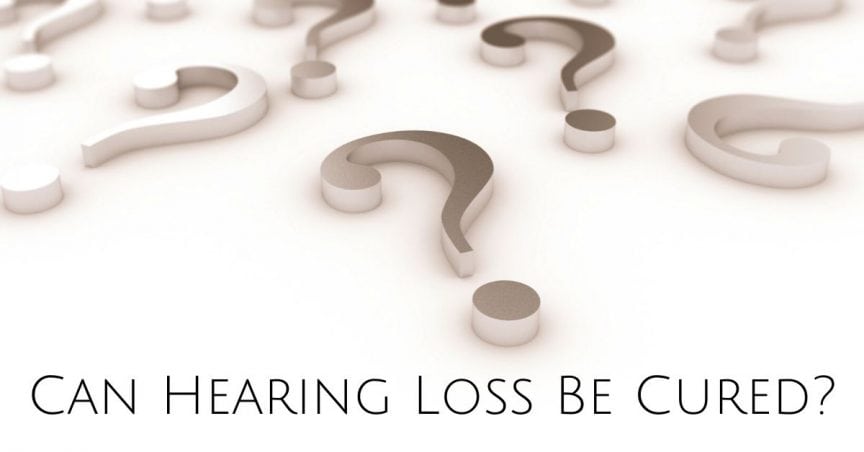- The Emotional Journey of Accepting Hearing Loss - October 25, 2024
- Making a Style Statement with Hearing Aids This Fall - October 15, 2024
- Fireplace Safety and Hearing aids - October 4, 2024
Hearing loss affects 48 million Americans. It’s among the most prevalent chronic health conditions facing older adults, and people of all ages suffer from hearing loss. Many people treat their hearing loss with hearing aids, but if you’ve recently noticed a change in your hearing health, you may be wondering if hearing loss can be cured.
How the Ear Works
The ear is a complicated structure that does some incredible things. The outer ear funnels sound waves down your ear canal, where they hit the middle ear or ear drum. Inside the middle ear are the three smallest bones of the human body, known as the ossicles. These bones move when sound waves hit the ear drum, and they send ripples into the fluid-filled middle ear, known as the cochlea. Here, small hair cells, or cilia, sway in fluid, and translate this movement into electrical signals that are sent along the auditory nerve to the brain. When they reach your brain, you experience sound. This all happens in the blink of an eye, but if any part of your ear is damaged, you won’t hear clearly.
Types of Hearing Loss
Before hearing loss can be cured, it’s important to understand the types of hearing loss.
Conductive hearing loss is caused by problems in the outer ear, the ear canal, or the middle ear. It’s often the result of a blockage in the ear, and can be caused by:
- A buildup of earwax in the ear canal
- Fluid in the ear canal or middle ear from an ear infection
- A foreign object in the ear canal
- A perforated eardrum from an injury
- An abnormal growth of skin or bone in the middle ear
Sensorineural hearing loss is caused by problems in the inner ear or damage to the cilia, and can be caused by:
- The effects of aging on the ear
- Exposure to loud noise
- A head trauma
- An abnormal growth or tumor in the inner ear
Mixed hearing loss is a combination of both conductive hearing loss and sensorineural hearing loss, for example having damage in the inner ear from aging, as well as a buildup of earwax in the ear canal.
Can Hearing Loss be Cured?
Finding a cure for hearing loss depends on the kind of hearing loss you have. A conductive hearing loss can often be reversed by removing impacted earwax, treating an ear infection with antibiotics, or even performing a surgery to correct a middle ear problem.
Sensorineural hearing loss, on the other hand, can’t be treated with antibiotics. The problem is in the inner ear, as the cells have been damaged over the course of your life, or by exposure to dangerously loud sounds in the environment that have destroyed the cilia. Once the cells die, they never regrow, and sensorineural hearing loss can’t be cured. The best treatment option is to wear hearing aids that will help your ears pick up on more of the sounds in your environment, and make sense of the sounds.
Finding a Cure for Hearing Loss
Researchers are looking for a cure for sensorineural hearing loss, and they’re making great progress! One approach to treating hearing loss is hair cell regeneration, where the cilia in the inner ear could be regrown after the cells have been damaged or die. Some animals, such as birds, frogs, or fish, can regenerate inner ear cells and restore their hearing. Dr. Stefan Heller is conducting stem cell research as a way to regenerate inner ear cells and find a cure for hearing loss.
Other researchers are studying genes to isolate the genes responsible for congenital deafness, and cure hearing loss using gene therapy.
Preventing and Treating Hearing Loss
Preventing hearing loss is currently the best way to keep your hearing healthy. Avoid exposure to dangerously loud sounds, turn down the volume on your personal listening device, and wear hearing protection when you’re in noisy places.
If you have hearing loss, treating your hearing loss with quality hearing aids will help you maintain your hearing, and enjoy all the benefits of hearing. You’ll easily follow conversations, even in places with a lot of background noise, and be able to locate sounds in your environment. You’ll enjoy clear communication with your loved ones, and maintain a high quality of life.

